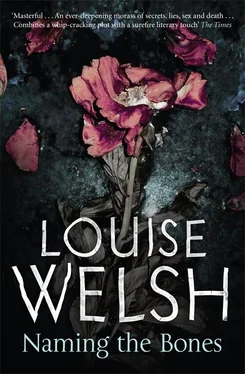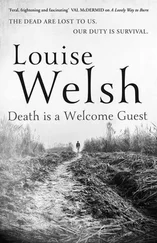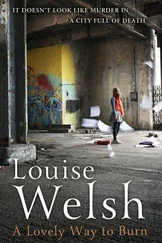He was woken by the landlady’s sharpening voice at the door.
‘Mr Watson, your dinner’s waiting.’
Murray sat up, like Dracula risen from the dead.
He would phone James and ask if he knew Bobby Robb, and perhaps while he was answering that question, the questions unasked would also slip into place.
There was no phone signal to be had in his room, or at the melamine dining table where his dinner waited, a slight skin forming over the brown stuff he supposed was gravy. It was a temptation to take his mobile straight out into the evening, but manners prevailed and he managed to work his way through a once-frozen chicken pie, tinned carrots and potatoes followed by half a tin of peaches topped with cream from a can. It was the best meal he’d had in a while, and he said so to Mrs Dunn, before pulling on his new waterproof jacket and stepping out into the bluster of the fading day.
Murray turned his back on the cottage and continued along the road that had brought him there. The bars on his phone remained stubbornly absent. He saw a sign marked Broch , and took the right turn its arrow instructed, into a stony road less finished than the last. It felt good to have a destination, even though he wasn’t sure what a broch was.
Professor James had known Lunan the man and the poet. He had been there at the birth of his sole collection, and though he’d not been present when the poet died, he had been close enough to go to the wake. If Christie insisted on keeping her silence, James might turn out to be the closest approximation of an eye witness available.
A small house appeared on his right, a square of scrubby grass in front of it, fenced off against the sheep. A toy tractor lay abandoned on its side beside the gate. Murray supposed that if you could stand the weather, this might not be such a bad place to raise a family. He’d assumed Archie and Christie were after a new centre for poetry and debauch, but perhaps they’d been hoping to put all that behind them, chasing ‘the good life’ on some hippy self-sufficiency kick. After all, for Lunan it had been some kind of a coming home.
The light was beginning to fade. He glanced at his phone. If he didn’t get a signal soon he would walk back to the car, drive down to the pier and try there.
Years ago, when he was working on his PhD, he’d gone out with a girl who studied archaeology. Angela. He’d fallen for her pale skin and red hair, would have been happy to spend all their free time together in bed, but their main recreation had been hill-walking to ancient sites. Angela had wanted to get engaged. He’d considered it, spent hours working out the pros and cons, and then, when the cons had won, broken up with her. He’d not seen Angela for years, hadn’t thought about her in a while. She was one of the crossroads in his life, a path he might have taken.
There was some sort of structure up on the rise beyond, or was it an outcrop of rocks? It was hard to be sure. He left the road and began to climb. The wind was mounting now, the ground soft beneath his feet.
As he got closer he could see that the structure was the remnants of a circular drystane dyke. Some sheep sheltering in its lea startled at his approach and rushed away with unwise haste, fat ladies running downhill in high heels. He halted and let them pass, the wind tearing at his face, feared that if he moved on he’d inadvertently round them over some unseen cliff.
Angela had probably told him what a broch was at some point. A fort, he supposed, or maybe a large tomb. He walked to where the wall had collapsed and peered into its centre, half-expecting to see the usual detritus that clogged lonely shelters: drained half-bottles of spirits, used condoms and dented beer cans. The interior dropped gently down into a slow dip, like a giant cauldron. Nothing except sheep shit sullied it.
Murray could feel the sense of being observed that had always infected him on his walks with Angela. ‘City-dwellers’ paranoia,’ she’d called it. But at least in the city someone would hear you scream. The sight of a few discarded johnnies would have been reassuring, a sign of life.
He looked back the way he had come. Now that he was at the top of the hill, he could see the day had reached the far side of dusk. The light was still with him, but he wasn’t sure how long it would last. It might be wiser to turn back while visibility was good, rather than risk a twisted ankle on the way down. Murray took his mobile from his pocket and was rewarded by three bars. He hunkered down in the shelter left by the sheep and found Professor James’s number.
He’d expected the phone to ring for a long time, but James answered on the second peal.
‘Ah, yes, I meant to ask if you would remember to pick up a packet of those fig biscuits, please, Helen. Iris likes them with her tea and I suspect the ones in the cupboard might be a little soft.’
Murray coughed, ‘I’m sorry to interrupt, Professor James. .’
‘Who is this?’
‘Murray. Dr Watson.’
He felt like an unsuspecting caller stumbling on a conversation on the party line, but the professor seemed unfazed.
‘I wondered when you would phone. Are you on your way round?’
‘No, I’m afraid not.’
‘I thought you were my daughter Helen.’
The old man sounder frailer than he had appeared the week before and a vague note that might have been confusion had entered his voice.
‘Would you like me to ring back later?’
‘No, best to get me while I’m still here.’
Murray knew better than to ask where the professor was going.
‘A name has come up. I wondered if it meant anything to you. Bobby Robb. He had a distinctive scar. .’
‘Yes, I knew him.’ James’s tone became firmer, as if he were on safe ground now the conversation had shifted to the past. ‘He wasn’t a regular, and when he did attend his work was derivative and confused.’
The professor’s manner was dismissive, as if Robb wasn’t worth discussing.
‘One of Archie Lunan’s friends said he blamed Robb for Archie’s premature death.’
‘I’m afraid that would be beyond my realm of knowledge.’
The statement was like a full-stop at the end of a sentence.
‘Was he close to Archie?’
‘His work wasn’t even in the same stratosphere.’
‘I meant emotionally.’
‘Dr Watson, are you in the habit of monitoring your students’ emotional entanglements?’
‘No.’
‘Then why might you think I would be?’
‘Professor James, I got the impression that you expected me to call at some point. Who did you think I was going to ask you about?’
The line went dead and for a moment Murray thought the professor was going to tell him to get back to him when he had completed his research. But then the old man sighed and said, ‘Your nemesis, of course. Professor Fergus Baine.’
‘My nemesis?’
‘I had a feeling you two were at odds.’
The wind blasted at Murray’s mobile phone. He wondered if Professor James could hear the sheep calling to each other in the background. They might be stupid, but at least they managed to live together in harmony.
‘Not as far as I’m aware.’
‘I must have misunderstood. Where are you? It sounds like you’re calling from inside the drum of a washing machine.’
‘I’m in Lismore. It’s a bit blowy, there’s not much cover.’
‘Have you seen Christie Graves?’
‘Not yet.’ The wind forced Murray to raise his voice. He already regretted walking up the hill instead of searching for a nice warm telephone box. ‘Why did you think I’d want to talk about Fergus?’
‘I thought your generation eschewed researchers, Dr Watson? Surely you don’t want me to do your job for you?’
Читать дальше












